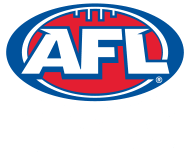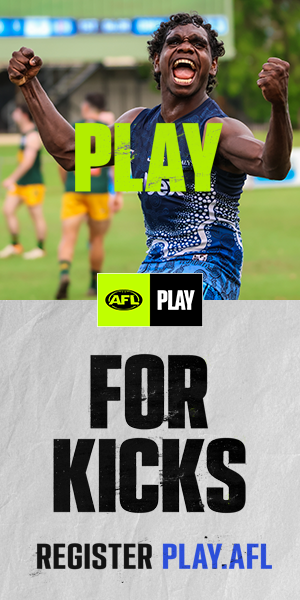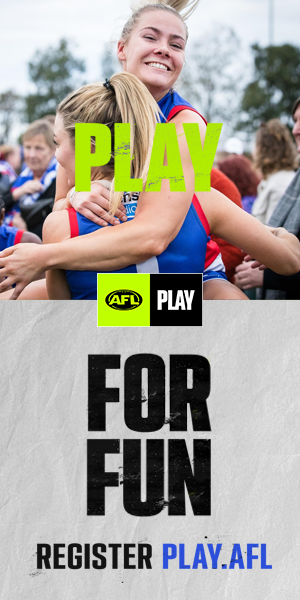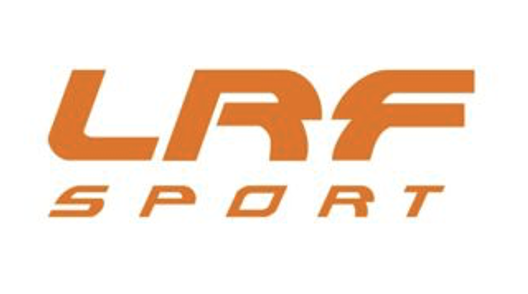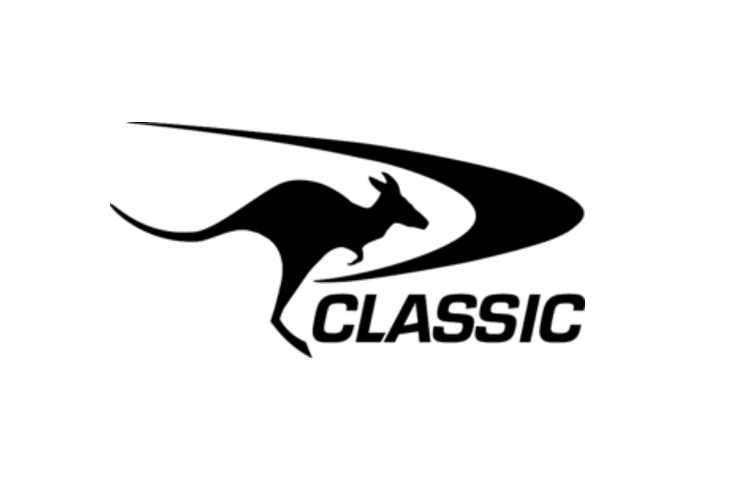A total of 197 Queenslanders have played in the AFL since Kedron’s Erwin Dornau was the first at South Melbourne in 1948 and 131 of them have done so since Mark Browning took charge of the Queensland talent pathway in 1997. He’s been a massive game-changer.
The former Sydney Swans champion has played a pivotal role in blazing a path from the one-time football backblocks of Queensland to the elite level and knows the background story of every Queensland player who made it, and countless more who didn’t.
If ever there has been a labour of love, this is it. As passionate about the cause as anyone could ever be, he’s had the football equivalent of a family birth 131 times.
It’s been an explosion that began when ex-Kedron-Grange forward Ben Thompson was drafted with pick #83 in the 1997 National Draft and played his only game with Carlton in Round 1 1999 alongside fellow Queensland debutant Brett Backwell, who was drafted at pick #67 in 1998. An extraordinary contribution from one man.
From the south-east Melbourne suburbs on Beverley Hills, son of Keith Browning, a 53-game South Melbourne player from 1951-54, the ‘father’ of the Queensland pathway has trodden the football path right up the east coast.
He played 122 games with South Melbourne 1975-1981 and 129 games with Sydney 1982-87 – 251 games for the Swans to rank 11th for the club all-time. Club champion in 1983, captain in 1984-85 and a regular Victorian State representative and a key figure in the club’s relocation to Sydney.
In 1988 he took over from the great Peter Hudson as coach of a Hobart side that had been down for a long time and had lost a promising young Alastair Lynch to Fitzroy. He took them to three grand finals, won the flag 1990, and coached the Tasmanian state league side to win over Queensland.
He worked for the Tasmanian Football League in a development role similar to that which he’d filled with the Swans, managing seven players and travelling thousands of kilometres to promote the code. Frustrated by the development scene in Hobart, he got into the hotel game, taking charge of first ‘The Telegraph’ on the Hobart waterfront, five minutes from Constitution Dock, and later ‘The Cresent Hotel’ in North Hobart.
After moving to Queensland for family reasons, he took over from Cameron O’Brien at Southport and coached the Sharks to the QAFL finals in 1994-95. In February 1996 he began as QAFL State Talent Manager, and is still there.
It’s an evolving role that has had a variety of components, and saw him coach the Queensland Under 18 side from 1996-2001 and in 2004 after Marty King did the job in 2002 and Jason Cotter in 2003. But in simple terms it’s all about identifying and preparing young Queenslanders for the AFL. Initially only boys, but today he oversees a program for boys and girls state-wide.
As the job got bigger it got tougher, and in 2005, needing to take on greater high-end responsibilities, he ‘sacked himself’ from the Under 18 job. In consultation with development ally Bob Batty, he launched a remarkable coaching journey.
Craig McRae, a 195-game Brisbane Lions triple premiership player, had retired in 2004 and was a qualified teacher interested in coaching. The perfect fit and a masterstroke. Browning focussed more on the bigger picture and was a shoulder to lean as McRae, now the Collingwood senior coach, began his own fairytale climb.
Wow. There’s no other word for it. In two years no less than 23 players who had played under McRae were drafted to the AFL – a Queensland record that seems unlikely ever to be broken.
In 2005 it was Courtenay Dempsey, Wayde Mills, Sam Gilbert, Rhan Hooper, Austin Lucy and rookie Cheynee Stiller. In 2006, when McRae’s Queensland Scorpions won the division two title undefeated, it was David Armitage, Shaun Hampson, Gavin Urquhart, Albert Proud, Brent Renouf, Brad Howard, Ricky Petterd, Kurt Tippett, Ben Warren, Paul O’Shea, Jesse White and rookies Chris Smith, Scott Clouston, Gavin Grose, Daniel Dzufer, Haydn Kiel and Joel Tippett.
Never more proud, Browning focussed on recruiting players from other sports via the ‘Rookie Search’ Program. Like Hampson (soccer), Renouf (rugby union), the Tippett brothers and White (basketball) from the McRae ‘cradle’, and others later like Charlie Dixon (basketball), Zac Smith (soccer), Tom Hickey (volleyball), Lachie Keeffe (soccer) and Tom Williams and James Mulligan (rugby union).
“We had a clear mandate to produce what the market needed, and for a long time we focussed heavily on talls – ruckmen and key position players who could learn and grow,” he said.
Every Queensland draftee was special to Browning, but Williams, the son of interstate rugby league player and a Broncos founding director Steve Williams, was extra special. Having come out of Gregory Terrace, where he had played rugby, he was rushed into the Queensland Under 18 side, played QAFL with Morningside, and was drafted by the Western Bulldogs at #6 in the 2004 AFL National Draft.
Such was his raw talent he was drafted after Lance Franklin at #5 and before Jordan Lewis at #7. And while recurring injury problems restricted his career to 85 AFL games, Browning cannot hide the pride he felt when, in Round 14 2007, Williams played at centre half back on Port Adelaide captain and all-time leading goal-kicker Warren Tredrea. It was the young Queenslander’s fifth AFL game and – more remarkably – only his 25th game of Australian football in total.
Lachie Keeffe, another ‘Rookie Search’ product, is another beauty, although in telling the Keeffe story Browning admits a stroke of luck. “I was chasing a guy called Jack Collins who was a boarder at Marist College at Ashgrove. I was going out to have a kick with him and he said ‘can I bring a mate?’ He did and it was Lachie Keeffe,” Browning recalls of the one-time Gympie soccer player now 16 years in the AFL system.
Browning, too, had a soft spot for Marc Woolnough, who wasn’t exactly a Queenslander but was a product of the Queensland pathway. Son of ex-Geelong and Collingwood player Mike Woolnough, he was ‘in the Nick Riewoldt class’ and ‘could have been anything’ but for major knee issues.
He is proud, too, to have ‘found’ three of the first four Sudanese AFL players. After North Melbourne’s Majak Daw blazed the way, Aliir Aliir, Reuben William and Mabior Chol followed. They won’t be the last. Not by a long way.
Critical to the talent pathway although not so well known was a simple change to age limits for Queenslanders. The over-age rule. He was the first to campaign for 19-year-old Queenslanders to be eligible for the Queensland Under-18 side.
“Most of the kids from the private schools in Queensland don’t finish school until their 18th year so we can’t get hold of them. Queenslanders naturally develop a little more slowly because they don’t grow up with the game. Kurt Tippett was a classic example,” he said, later adding 17-year-olds to his Under-16 program for the same reasons.
“It’s not just been about developing players for the AFL. A lot of kids who don’t quite make it the elite level became 200-game players at State League clubs like Damien Bonney at Morningside,” Browning said.
“Community clubs have been amazing in their support of the talent programs, which now include the academies and will be a constant source of new talent.
“I’m rapt to see the explosion in the girls game and the fact that 85% of the Lions side, which has set the bar in the AFLW competition, are Queenslanders, and it’ll keep growing.”
Enjoying life with partner Ann-Maree, their combined children Kristel, Kane, Alex and Charlie, and grandchildren Delilah and Bon, Browning says he has had ‘the best job in the world’ for more than a quarter of a century, and has ‘loved every minute of it’.
